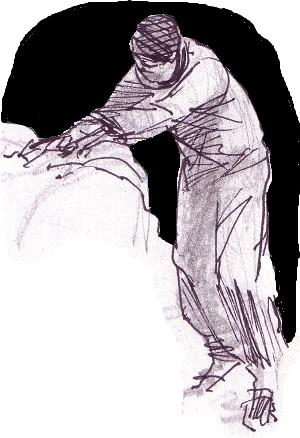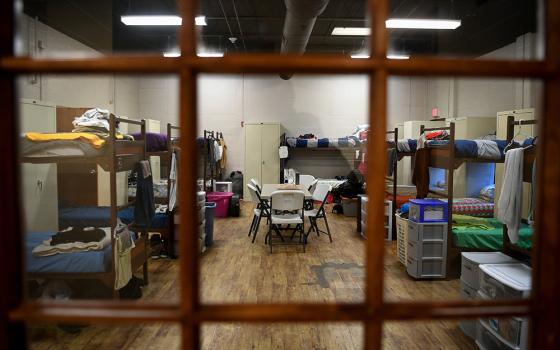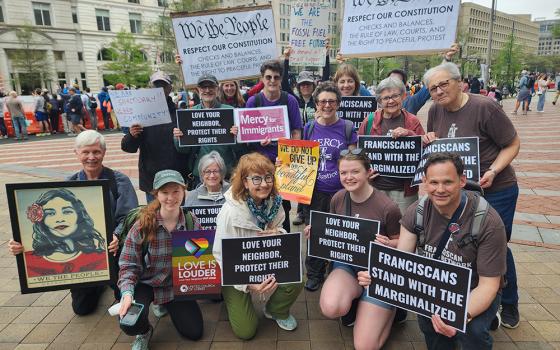
“Surely it is not I, Lord” (Matt 26:22).
Wednesday of Holy Week
The Scriptures for a third time linger on Judas’ betrayal of Jesus, who casts a shadow over their Passover meal by saying, “One of you will betray me.” In deep distress, the Apostles reply one after the other, “Surely it is not I, Lord?”
Perhaps even Judas, to deflect attention, feigns innocence by asking the same question. But he has already determined in his heart to hand Jesus over to the authorities, and he already has the 30 pieces of silver in his pocket.
Who was Judas Iscariot? One meaning for his name is a later tradition associating it with the Greek sikarios for “dagger,” connecting him to zealots who opposed the Romans. This suggests he may have betrayed Jesus out of impatience with his nonviolent approach to the occupation. Or, as an intimate friend of Jesus within the circle of disciples, he acted out of jealousy, or perhaps he thought he could precipitate the revolution by forcing Jesus’ followers to rescue him if he were arrested.
We don’t know the full story, and the Gospels cloud any analysis of human motives with fulfillment prophecies or the simplest explanation that Judas did it for the money.
Matthew sets the scene by scanning the circle of faces at the Passover table, as each disciple disclaims, “Surely it isn’t I.” We are placed in that circle and must answer for ourselves. This is the second time Matthew has done this to us. The first was in Chapter 16, when Jesus asked his followers, “Who do you say that I am?” Only Peter had insight enough to cross the threshold of faith and declare Jesus to be the Christ. But this is the same Peter who will boast of his loyalty to Jesus, then later disown him to save his own skin.
For us to say from our hearts that we believe Jesus is the Christ is an act of faith that brings our whole lives into focus out of vague nominal assent. More is required of us. The deeper question, as Jesus approaches his sacrificial death is, “Are you still with me?”
Betrayal can come in many forms, including silence or indecision or walking on past the moment we could have said, “Yes, Lord. Here I am.” As Holy Week takes us into the Triduum of Holy Thursday, Good Friday and the Easter Vigil, we must decide where and with whom we stand.
The question of who abandoned, denied or betrayed Jesus focuses on each of us, but especially on his closest friends. They knew him, lived with him, ate with him, saw his miracles and heard his message. The Gospels make no effort to spare them the truth that they gave up the Christ in order to save themselves. Twenty centuries later, if we do not feel the weight of this same indictment, we will not fathom the forgiveness the risen Jesus offers us on Easter.
God’s healing and forgiveness invite repentance on our part. We acknowledge the sins of our church for the betrayal of all victims of sexual abuse, anti-Semitism and the institutional racism that has marred the mission of the church as we recall the martyrdom of Dr. Martin Luther King Jr on April 4, 1968.
---------------------------------
During Lent and Holy Week, many of the scripture readings will reflect the political and religious divisions and uncertainty that roiled Judaism and the earliest decades of Christianity. Our reflections will take into consideration that the texts contain language that historically served to foster ugly stereotypes and fuel ancient hostility toward Jews. The Catholic Church took a huge step toward correcting those perceptions in the Vatican II document Nostra Aetate. More than 50 years after the promulgation of that document, the church is still wrestling with how to interpret our sacred texts in light of new research and understanding. A good point of reference is a 2019 talk by Pope Francis to the Pontifical Biblical Institute as it addressed the topic, “Jesus and the Pharisees: An Interdisciplinary Reappraisal.” He spoke of the need to “find ways to overcome ancient prejudices.”






